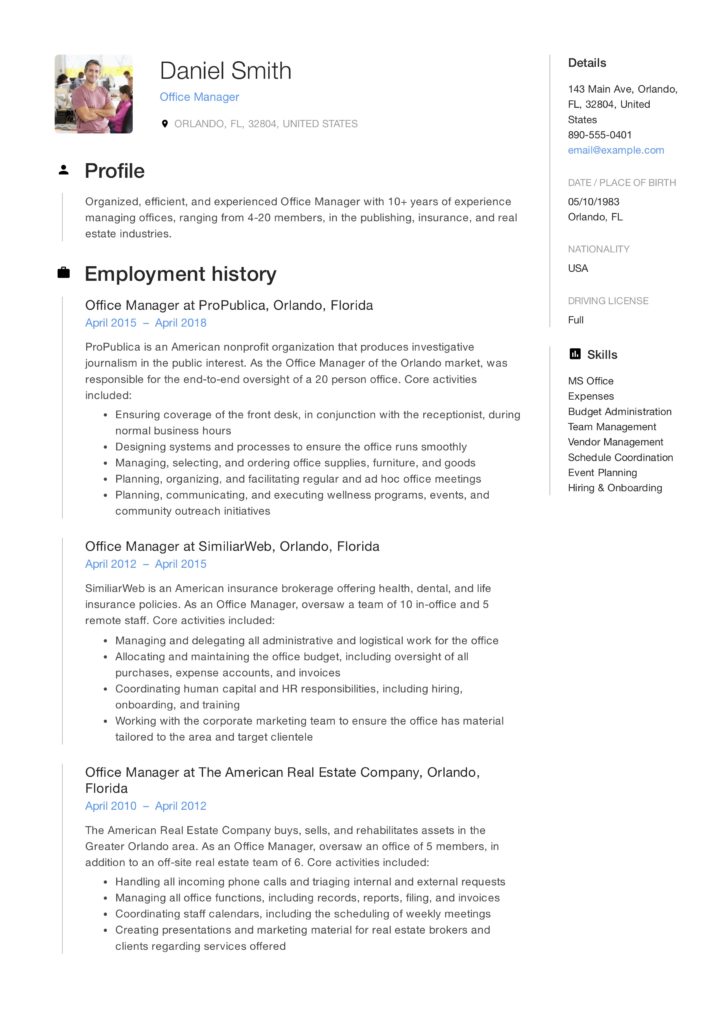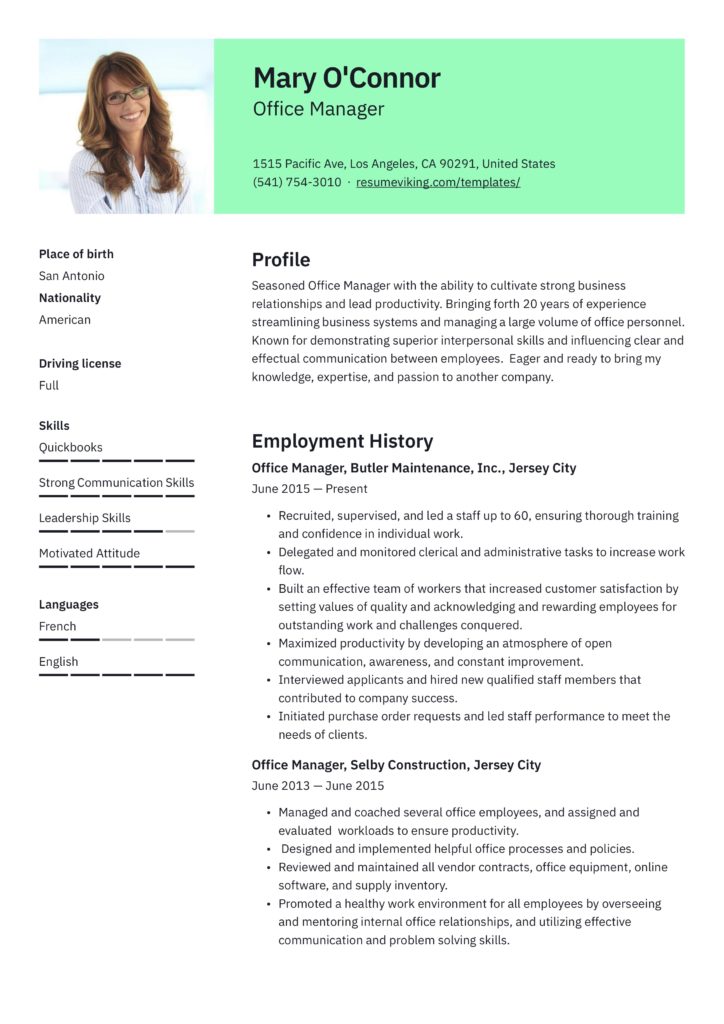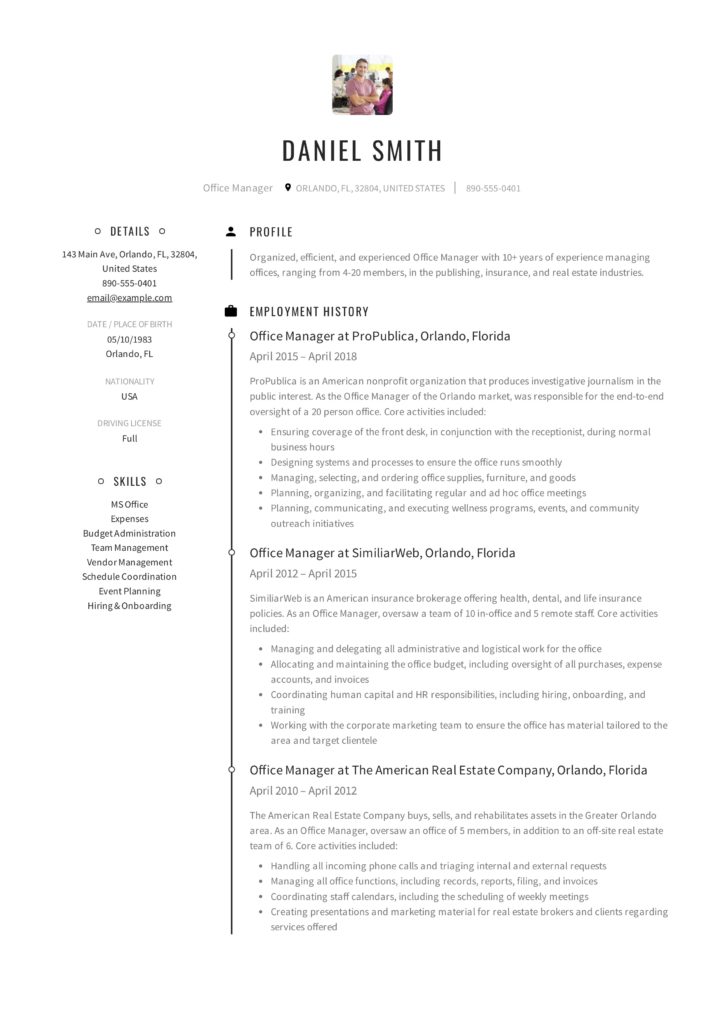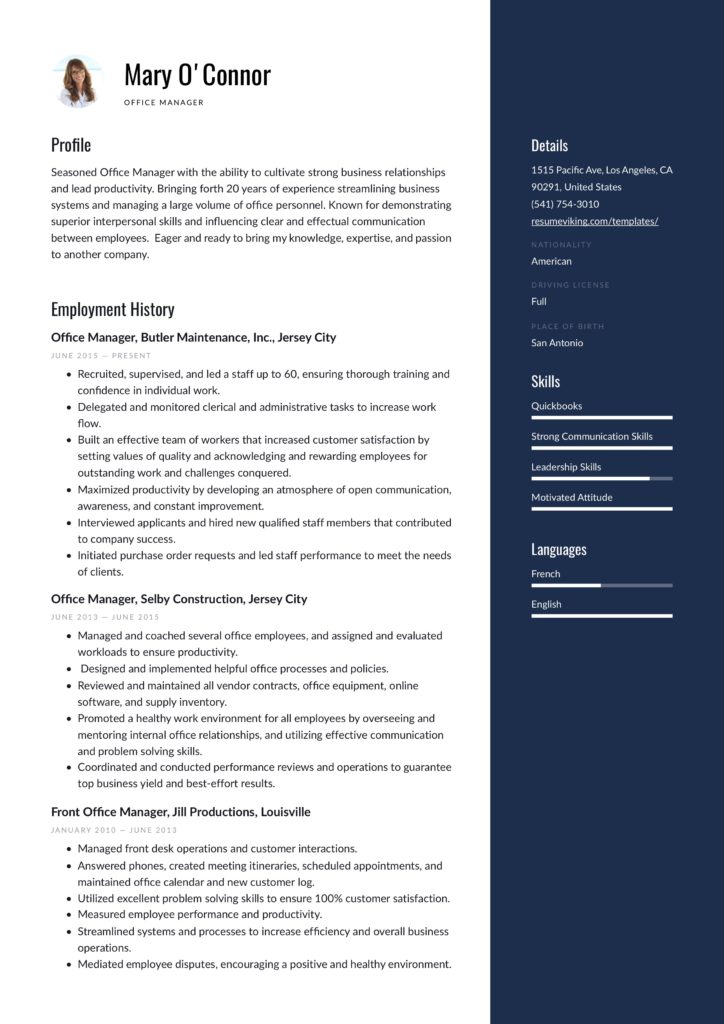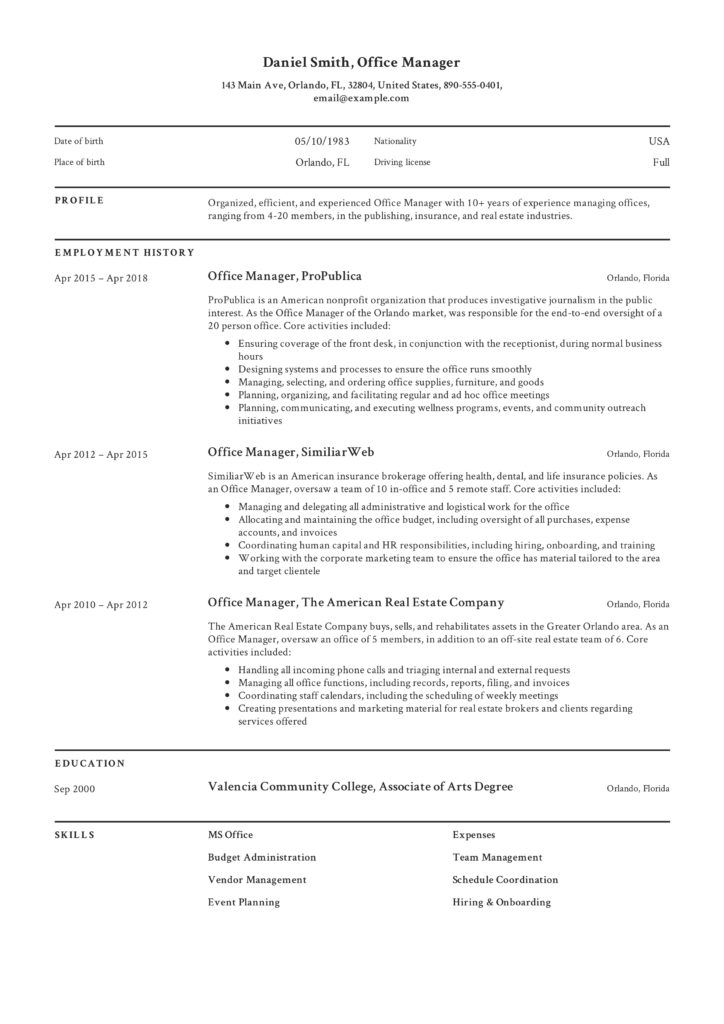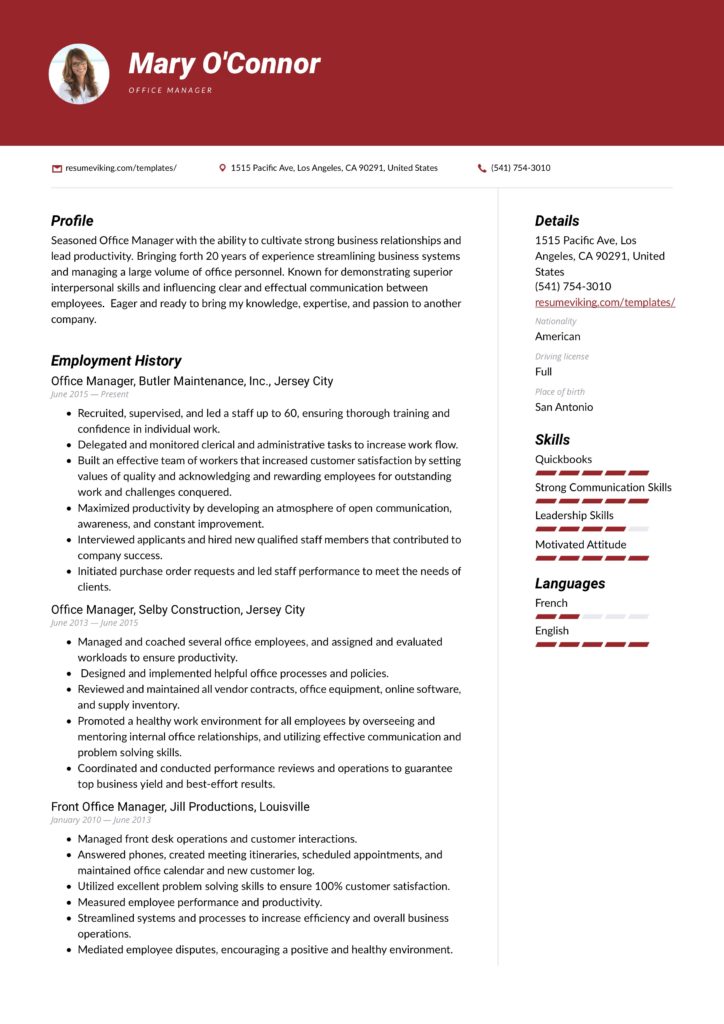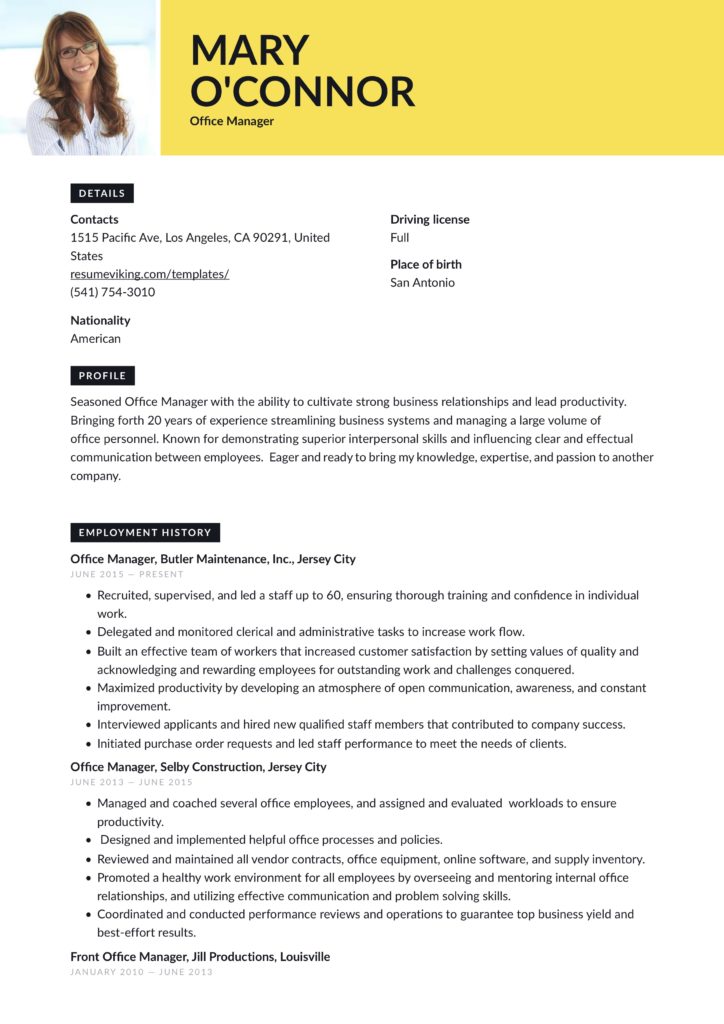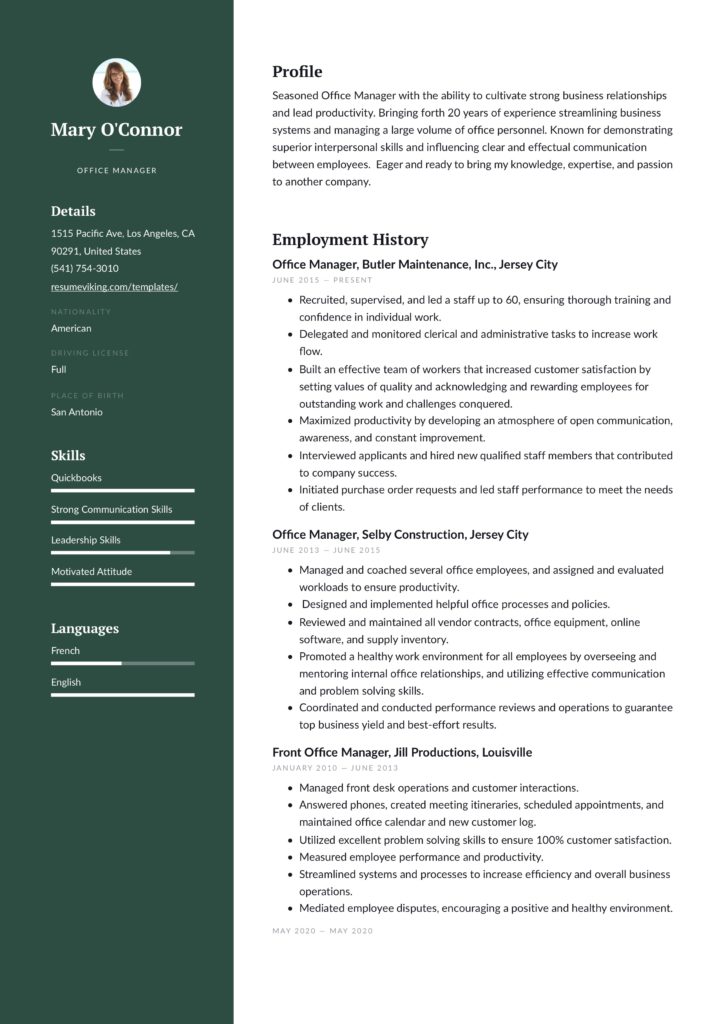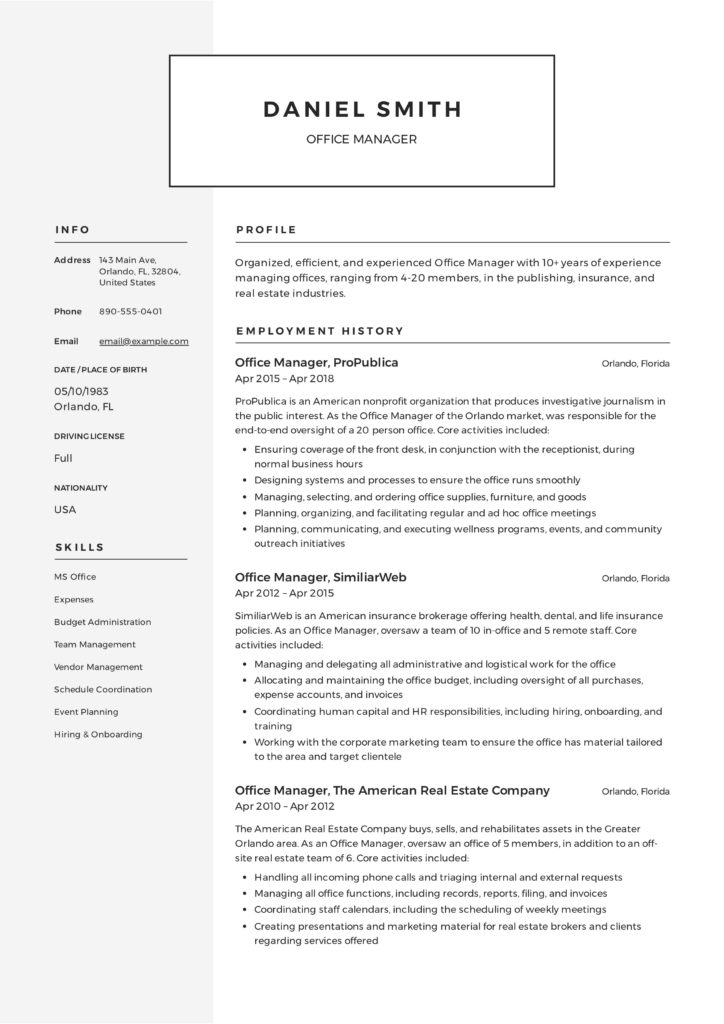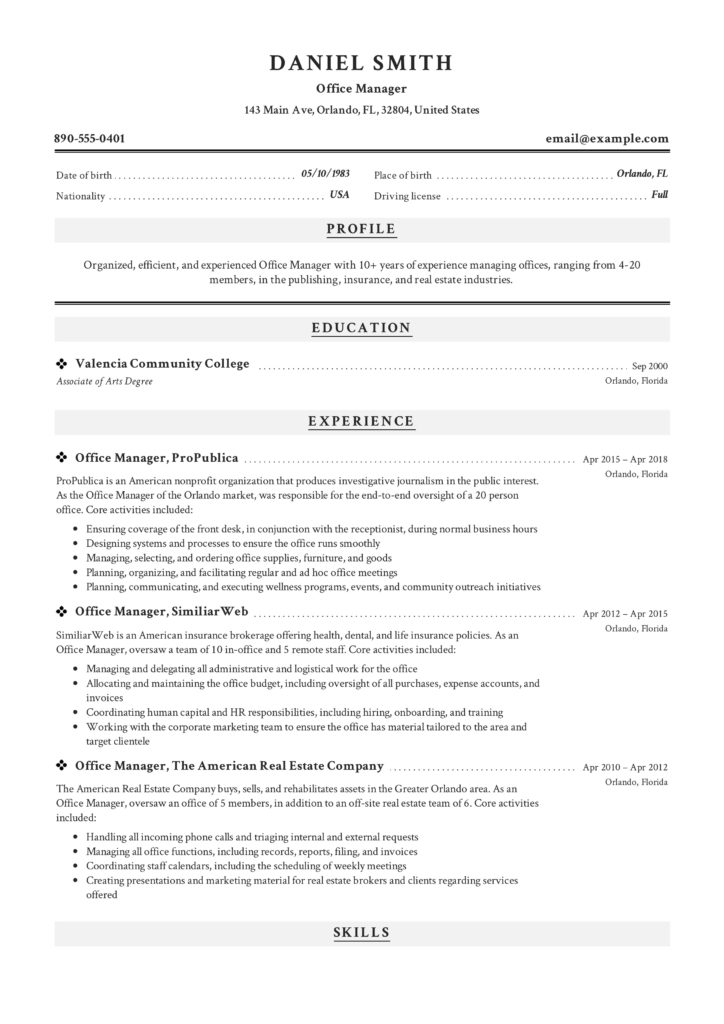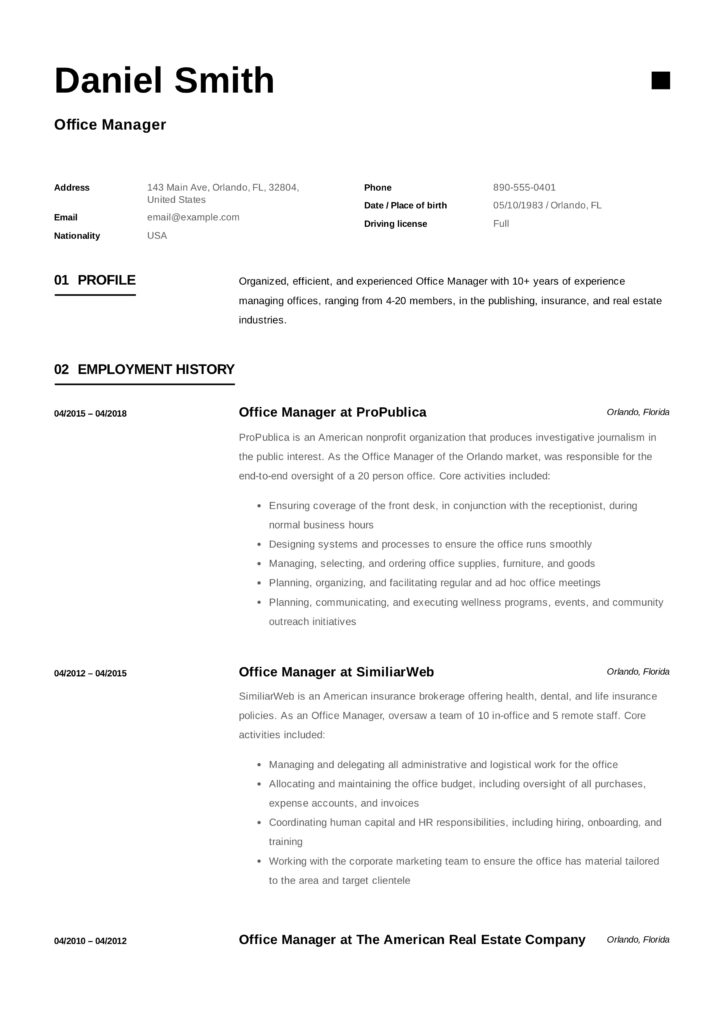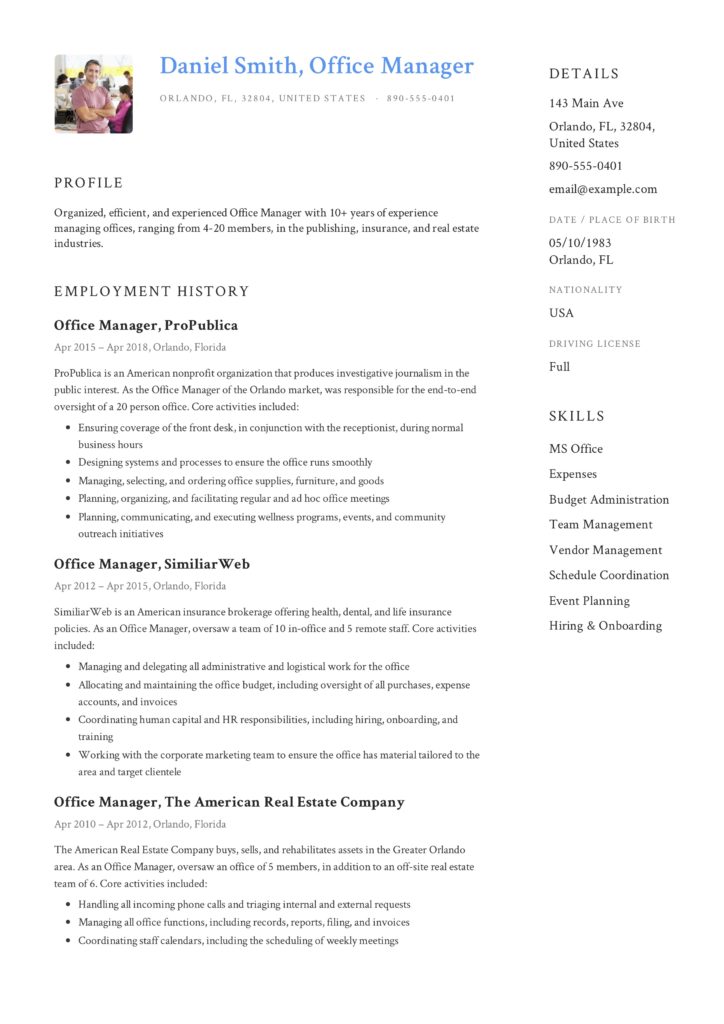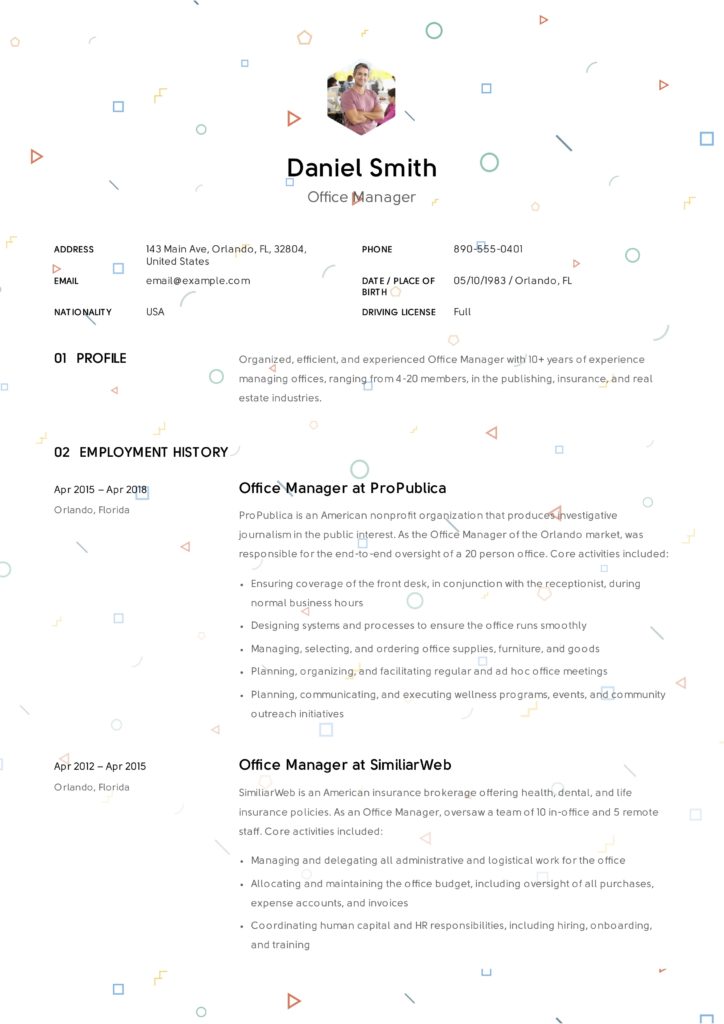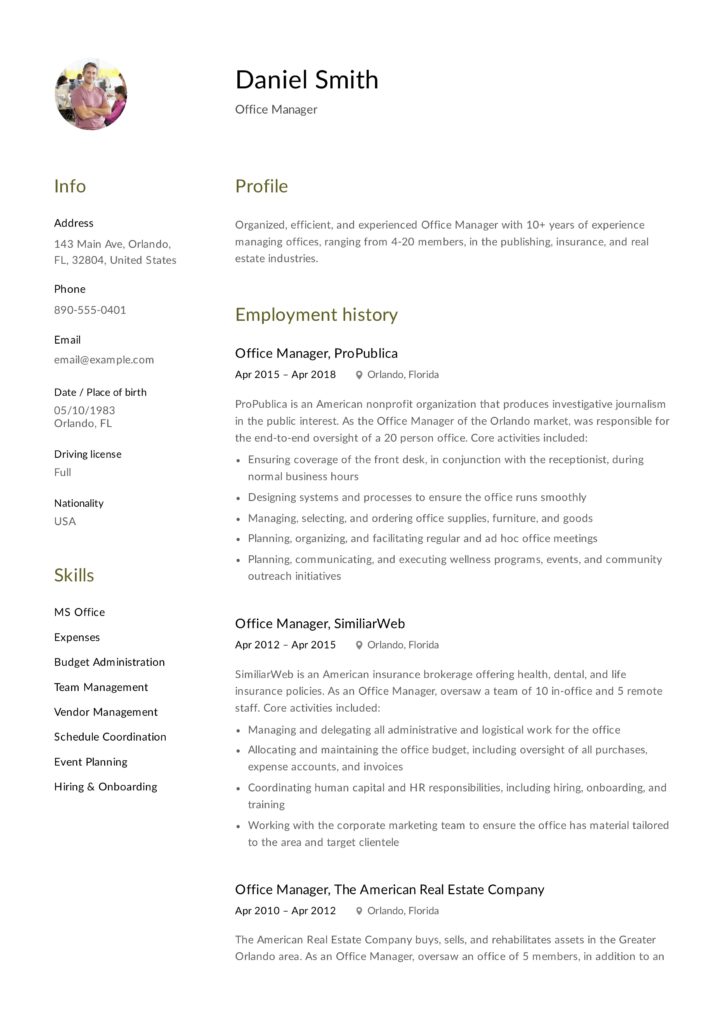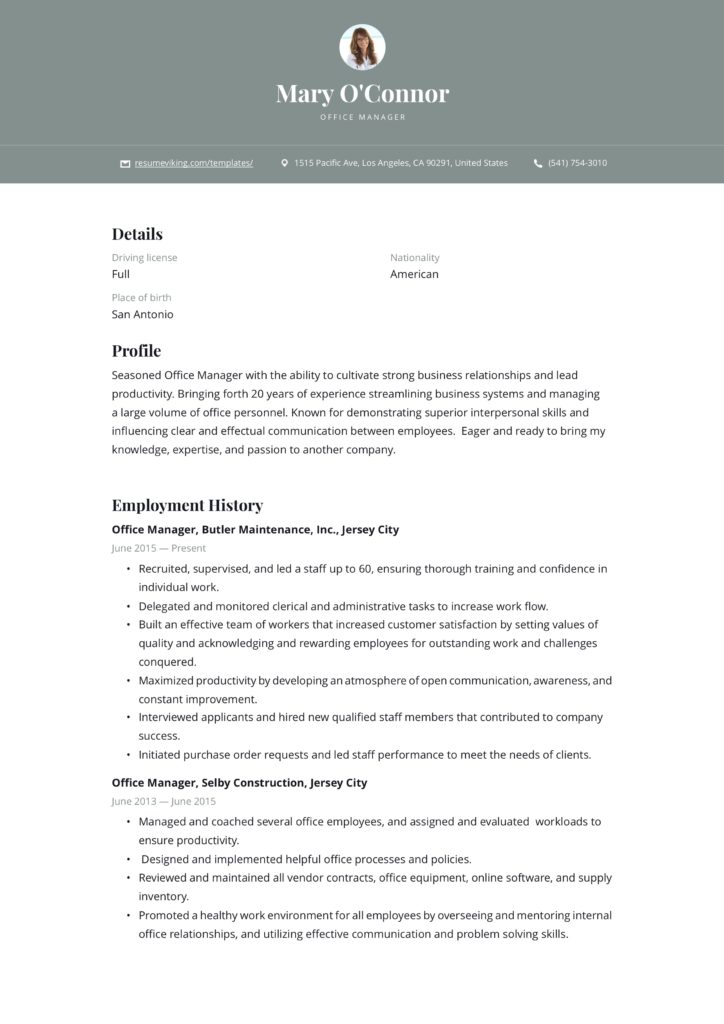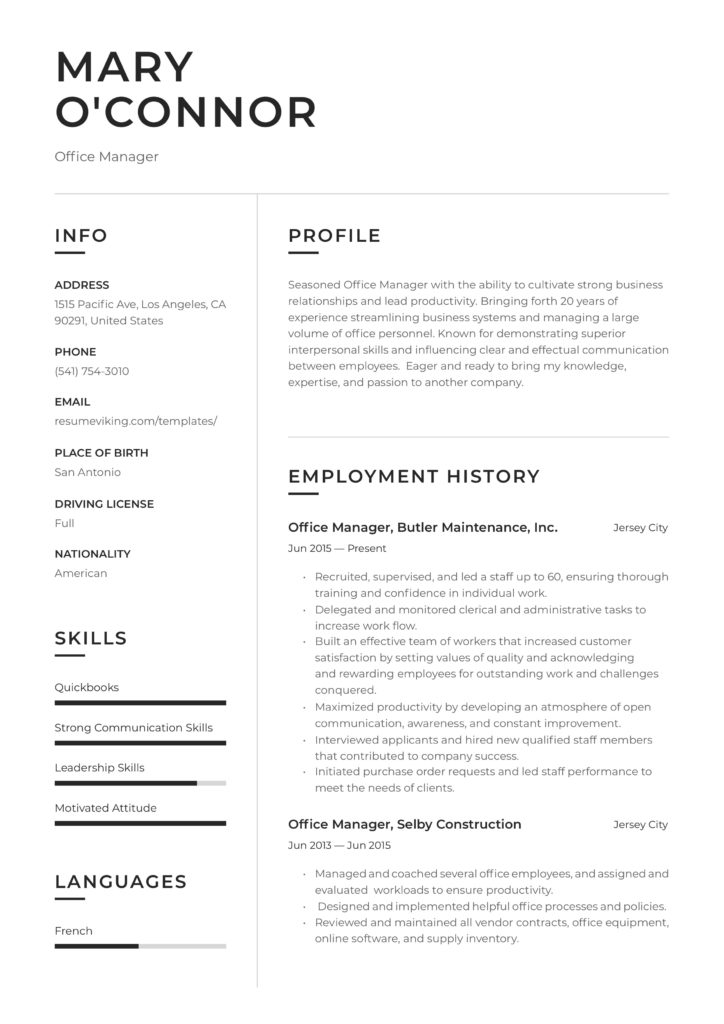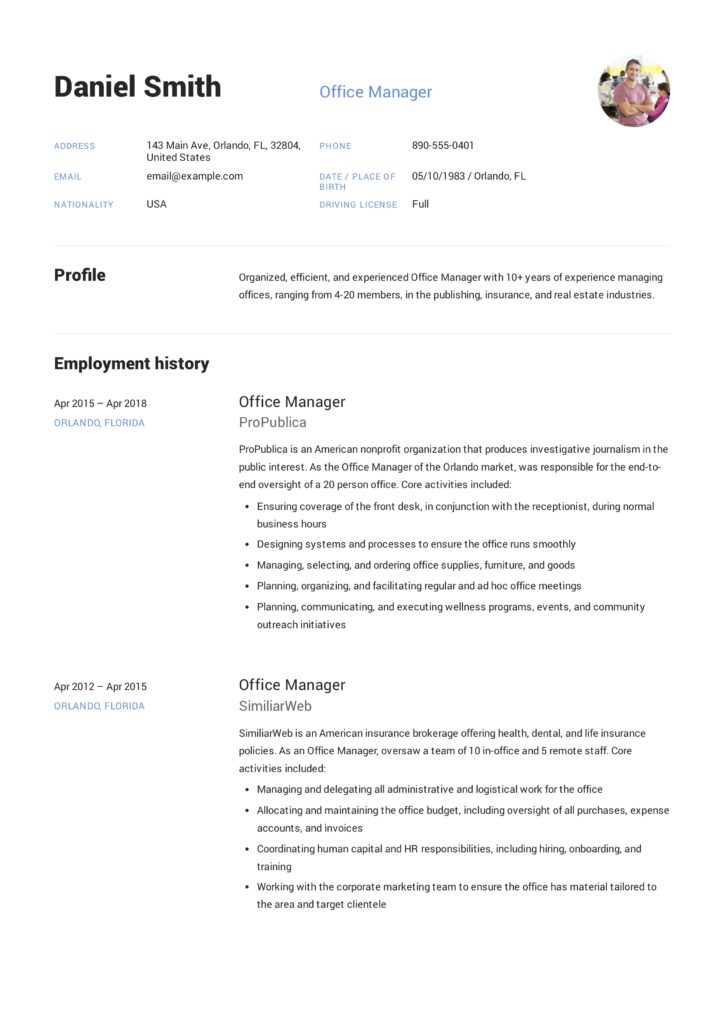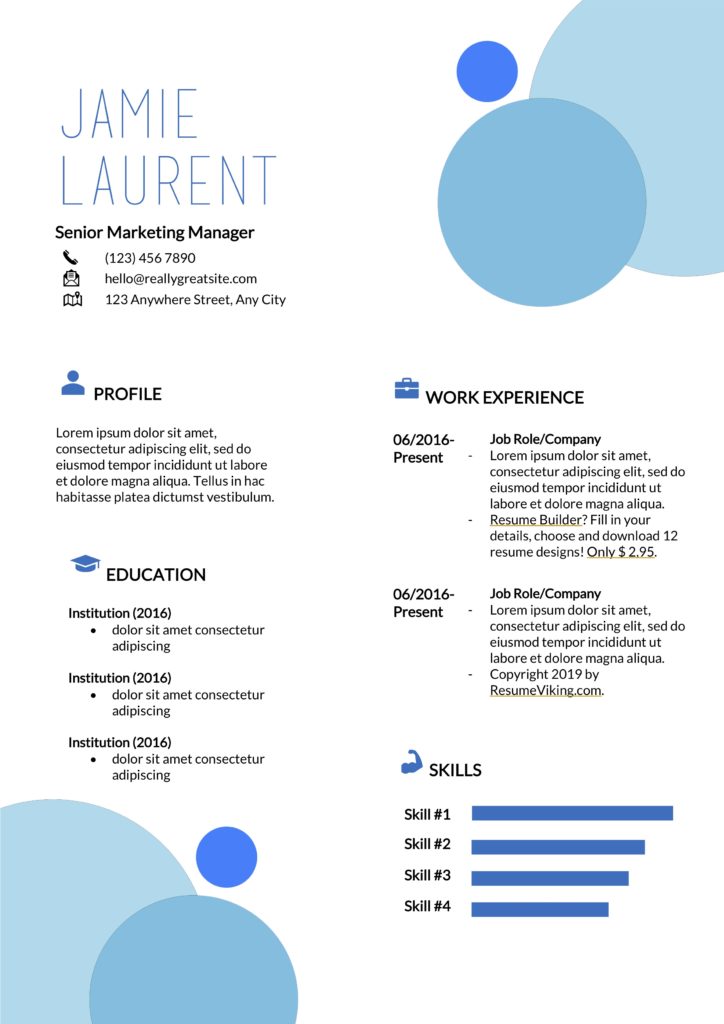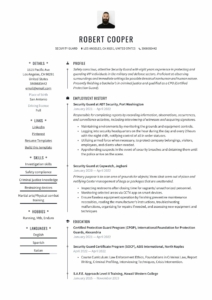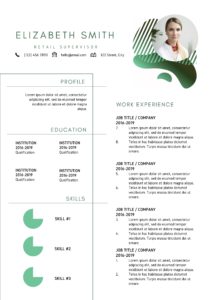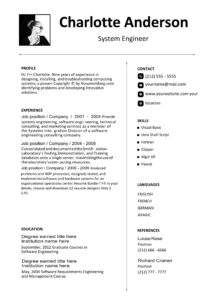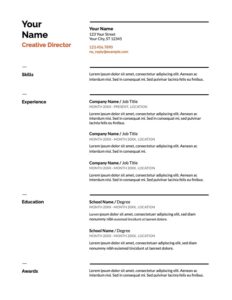Are you on the hunt for a new Office Manager position? The first step in landing a new role is to make sure your resume is up to par.
To do this, you should check out Office Manager resume sample(s) and then pick your favorite one to use as a template.
This guide will not only break down top-performing Office Manager resume sample(s), but it will also give you a step-by-step guide to writing a resume that is relevant in today’s highly competitive job market.
The phone will be ringing off the hook in no time!
What you can read in this article
19 Office Manager Resume Examples
The Office Manager Resume Guide
Resume Sections:
1. Contact Information:
- Name
- Address
- Phone Number
- Driver's License
- LinkedIn (optional)
- Nationality (optional)
- You are welcome to add social media URL's too, giving recruiters and hiring managers a bit of extra personal and professional contact into your candidacy
2. Professional Summary / Career Objective:
1 – 3 sentences giving a broad overview of your background, years of experience as an Office Manager, the number of people you have supported in your offices, and the industries you have worked in. (see examples below)
3. Employment History:
Showcase your employment history. Include the company name, your title, the dates of employment, and a list of your daily responsibilities for each of the previous positions that you have held.
4. Education/ Certifications/ Coursework/ Training:
Most companies (but not all) employers require at least an AA/AS degree to be an Office Manager. Include each degree you have obtained here.
5. Key Skills:
List of key skills that you possess that align with the job descriptions you are applying for.
What Hiring Managers Want to See
You are probably wondering, what do hiring managers really want to see on an Office Manager resume?
The first thing to include is the number of years you have been an Office Manager. While some offices will be okay with hiring someone relatively new, other environments are quite demanding and require a seasoned professional.
You should include how many years you have been an Office Manager in the professional summary section at the top of your resume.
Next, you should explain how large the offices were that you were supporting. No- we are not talking about how many square feet. We are referring to the number of employees that sat permanently onsite, as well as the number of off-site workers that relied on your office’s functions.
Typically, hiring managers want to make sure you have dealt with the same number of people, if not more, than their office has. There is a big difference between running and approving expense reports for 30 employees versus 5. Likewise, there is going to be a sharp learning curve if you are suddenly required to manage 20 people’s calendars when you are only used to juggling 6.
You should include the number of people in your offices both in the professional summary section at the top of your resume, as well as in each position description.
You also need to indicate the type of industries you have worked in. Each industry has its own lingo, processes, and metrics, so most employers want to make sure that you will be familiar with their activities and jargon.
For example, if you are coming from a staffing agency whose office activity revolves around ‘placements’ and ‘spread’, you might be a bit bewildered in an insurance company that is always talking about ‘benefits’ and ‘coverage’.
Include the industries you have worked in both in the professional summary section at the top of your resume, and in each position description.
Lastly, you should include the types of software and tools you know. This includes things like Microsoft Office products, including PowerPoint, Excel, Outlook, and Word, as well as any special accounting or financial software you know how to use.
Writing a Resume Summary
Your resume summary, also known as a Career Objective, is the first thing an employer will read on your resume and is essentially an appetizer to get them ready for what’s to come.
Since hiring managers are on a tight schedule and don’t spend a lot of time looking at each resume, you need to draw them in quickly with an effective professional resume objective profile.
The goal of your objective is to give the reader a broad overview of your past work experience, your areas of specialty, and why you would be the perfect fit for their role.
Start your summary with your title, such as Office Manager, followed by your years of experience. Use the next line to outline the number of people you have supported in your offices, for example, ‘teams ranging from 5 – 20 people’.
Next, include the industries you have worked in, such as real estate or insurance. Lastly, include some of your core competencies that align with the job descriptions you are applying for.
Resume Objective Examples
To give you an idea of what an Office Manager pobjective should look like, we have provided some career objective samples below.
Example 1
“Office Manager with over 10 years of experience managing teams ranging from 10-20 people. Industry expertise includes insurance, real estate, and publishing domains. Core competencies include budget administration, employee onboarding and training, and event management.”
Example 2:
“Office Manager with 3 years of experience managing a team of 6 employees in the IT industry. Known by peers and supervisors for creating processes and procedures that contribute to office efficiency. Passionate about creating health and wellness programs for the office.”
Office Manager Job Description and Responsibility Examples
After finishing your career objective, you are ready to move on to your Professional Experience section. If you are going with a chronological resume format, you should start with your most recent position at the top.
For each position, include the name of the company you worked for, your position title, your dates of employment (including month and year), and list of your daily responsibilities.
To get you started, we have included a list of Office Manager responsibilities that you can add to your professional experience section.
Office Manager Responsibilities:
- Creating a positive, clean, and orderly work environment for both internal employees and office guests
- Designing systems and procedures to ensure all office activities run smoothly
- Working with Human Resources to schedule interviews, as well as hire, onboard, and train new employees
- Selecting, managing, and ordering all office supplies, furniture, and goods
- Creating health and wellness programs, as well as productivity initiatives for the office
- Allocating, tracking, and maintaining the office budget, including the approval of expense reports and invoices
- Scheduling and facilitating office meetings for both internal teams and for clients
- Working with marketing teams to make sure the office has all necessary marketing material, including business cards, flyers, and sales decks
- Organizing and facilitating trade shows and events
- Delegating and handling all administrative tasks for the office, including filing and internal/external communications
How to Quantify Your Resume
Employers love reading numbers on a resume because it makes your experience feel more tangible. When writing your resume, if you can answer the questions, “How much?” or “How many?”, you should include that number. For example:
- How many employees did you support?
- How many events did you schedule and facilitate a week?
- How large was your office budget?
Office Manager Key Skills
Similar to your Professional Experience section, your Key Skills section will give employers a brief overview of your technical and functional expertise as an Office Manager.
While completing this section, pay special attention to the qualifications listed in the jobs you are applying for and make sure you include those in your key skills section (if you have them, of course!).
To help you get an idea of what employers will be looking for in your resume, we have included a list of Office Manager key skills below.
Office Manager Key Skills
Functional Skills
Team Management, Process Improvement, Meeting Facilitation, Documentation, Filing, Supply Management, Budget Administration, Guest & Client Relations, Employee Hiring, Onboarding & Training,
Technical Skills
MS Office, PowerPoint, Excel, Outlook, QuickBooks, WorkDay
To give your key skills section some additional weight, you may choose to list ‘Beginner, ‘Proficient’, or ‘Expert’ next to each of the listed skills.
Soft Skills Needed
For an Office Manager, your soft skills are often more than important than your functional skills. If you aren’t sure what soft skills are, they relate to your personality and work ethic. They are the things that people innately possess, rather than things that people learn.
As an Office Manager, most of your responsibilities involve dealing with the employees in your office. This means you need to have excellent leadership and communication abilities.
To show employers that you have the soft skills they are looking for, try to incorporate these into your profile, key skills, and cover letter sections:
- Organized
- Driven
- Multi-Tasker
- Punctual
- Efficient
- Proactive
- Detailed
- Process-Oriented
- Resourceful
Finalizing your Office Manager Resume
Wohoo! You now have a shiny new Office Manager resume sample! But wait… we aren’t quite done yet. Before you send your resume off to those dream employers, there are a few last things you need to do.
To make sure there isn’t anything critical missing, check this resume checklist. Sometimes the most obvious things get left out!
Next, figure out where to post your resume. The most common options are Monster, CareerBuilder, LinkedIn, and Indeed.
Last, proofread! Don’t be afraid to have a friend or colleague review your resume for you too. MS Word doesn’t always catch everything, and you never want to make a bad first impression with incorrect spelling or grammar.
Whew-Okay, your resume is good to go! Save it in both .doc and .pdf file format, send it out, and get ready to put your interview suit on.
Office Manager Resume Keywords & Action Verbs
When writing your professional experience section, don’t make your employment history sound like a passive, boring list of tasks. Instead, help employers envision you performing your job by using these Office Manager-specific action verbs:
| Managing | Designing | Selecting |
| Ordering | Stocking | Answering |
| Overseeing | Administering | Delegating |
| Prioritizing | Corresponding | Booking |
| Facilitating | Fielding | Handling |
| Filing | Planning | Hiring |
| Training | Onboarding | Creating |
| Marketing | Promoting | Supplying |
| Implementing | Assigning | Mainting |
Office Manager Cover Letters & Thank You Notes
Click to write and download an Office Manager cover letter.
Already landed your first interview? Then it's time to write the perfect Thank-you Note.
